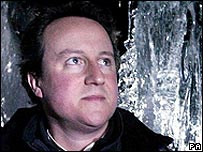|
Analysis
By Nick Assinder
Political Correspondent, BBC News website
|

Voters have delivered a decisive and damaging verdict on British prime minister Tony Blair who now faces the judgement of his own party on his future as prime minister.

Blair will attempt to draw line under result
|
Local council election results across England may not have been the meltdown predicted by some of the most pessimistic in Labour's ranks - but some of them had been deliberately talking down their prospects to make the actual result look marginally better.
But, after almost two weeks of disastrous headlines - over Deputy Prime Minister John Prescott's affair with his secretary, a row over the release of foreign offenders who then committed further crimes and threatened strikes in the health service - Labour was delivered a resounding defeat.
An apparently reviving Conservative party, under new leader David Cameron, did as well as they had dared hope and topped the poll with their best performance since 1992.
The third party, the Liberal Democrats, failed to move forward, suffering from the revival in Tory fortunes - something that may bode ill for a future general election and may yet raise a question mark over new leader Sir Menzies Campbell's position.
But they still managed to push Labour into third place. And there were some gains for smaller parties, notably the hard-right British National Party.
For his part, the prime minister immediately embarked on a cabinet re-shuffle in an attempt to draw a line under his recent troubles and, in effect, re-launch his government.
Waning authority
But there were instant calls from his own side for him to resign soon, rather than attempt to battle on for a full third term in office before quitting, as he has pledged to do.

Cameron has scored significant advance
|
Supporters of the man long seen as prime-minister-in-waiting, Chancellor Gordon Brown, believe the drubbing is a direct consequence of the prime minister's waning authority and refusal to listen to voters' concerns over a whole series of policies on the welfare state, civil liberties and, still, the war on Iraq.
They want Mr Blair to, at least, announce a timetable setting out exactly when and how he plans to hand over power to Mr Brown - and they expect that transfer to be soon.
There are even suggestions that some other, predominantly left-wing MPs, are planning to threaten to force a leadership contest if they fail to get the promise they are seeking from Mr Blair.
Mr Brown has brushed all that aside, but stressed the need for the party to "renew itself" and announced he would be meeting the prime minister over the weekend to sort out how best to do that.
The prime minister's supporters, on the other hand, insist the result was a setback, not a disaster, and could only have been expected in the wake of the recent hugely-damaging headlines.
There are even suggestions that Mr Prescott was being lined up to take the blame and that he is to lose his responsibilities as deputy prime minister, while keeping the title along with the job as deputy Labour party leader.
Similarly it is possible senior ministers, notably Home Secretary Charles Clarke who presided over the foreign offenders furore, and Health Secretary Patricia Hewitt may be moved into different jobs, if not sacked.
Centre ground
But there must be a question mark over whether a re-shuffle can stop the rot and head off demands for Tony Blair to go.

Sir Menzies only held his ground
|
Many Labour MPs will not accept attempts to blame the election results simply on the recent troubles, but will lay them firmly at the prime minister's door.
They are concerned that the Tory party under David Cameron appears to be making the recovery it has longed for but which has eluded the past four leaders.
And Mr Cameron, whose controversial "modernising" agenda has seen him take his party firmly towards the centre ground, has plenty to smile about.
His party may still have failed to win councillors in the big inner cities like Manchester and Liverpool - something Mr Cameron has said is essential to a full recovery.
But for the first time since Labour first swept to power in 1997, his MPs will be able to point to significant signs that they are on their way back.
If he can maintain this momentum there is the real possibility that, by the time of the next election - still four years away - he will be in position to seriously challenge Labour.
Drink problem
That may well be bad news for the Liberal Democrats who have previously done well when voters expressed their opposition to Labour and Tony Blair, but were reluctant to transfer allegiance to the Tories.

Prescott affair was issue in poll
|
Sir Menzies' election as party leader, after the damaging removal of predecessor Charles Kennedy over a drink problem, was controversial enough, with some claiming that he was too old and lacked the sort of charisma deemed necessary in modern politics.
Then there was the shock advance of the BNP, particularly in the London borough of Barking, which was being put down to some voters' anger at government policies on housing, immigration and asylum.
The local Labour MP, Margaret Hodge, was also under attack from her own side for having graphically warned of widespread support for the BNP and, as a result, given the party credibility.
But all eyes will now focus on 10 Downing Street - and not just to see who is in, out, up and down in the ministerial reshuffle.
Labour MP and former minister, Frank Dobson - who saw his once rock-solid Labour council fall to no overall control - dismissed the re-shuffle as , "rearranging the deckchairs on the Titanic".
And whether the prime minister can now survive those calls for his resignation is without doubt the biggest question still to be answered.
Nick.Assinder-INTERNET@bbc.co.uk


